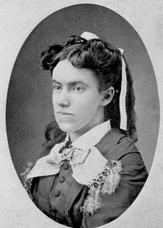By David Roach
NASHVILLE (BP) — Augustine of Hippo is known by Christians the world over for standing against heresy in the fifth century and laying a foundation for the Protestant Reformation a thousand years later.
Lesser known is the fact that Augustine might never have become a Christian if not for his mother Monnica, who prayed for his salvation for years before eventually sailing from North Africa to Italy to beg her son to attend church. He honored her wishes and was saved when he heard the Gospel under the preaching of Ambrose of Milan.
Monnica — as her name is spelled on her tomb despite commonly being rendered as “Monica” — is one of many noteworthy mothers in church history.
“Some of Christian history’s greatest preachers, theologians and missionaries owe the first fruits of their ministries not to their exegetical insights, homiletic abilities or spiritual zeal, but instead to the faithful prayers of their godly mothers,” Christian George, assistant professor of historical theology at Midwestern Baptist Theological Seminary, told Baptist Press in written comments. “In the lives of countless Christians throughout the ages, God has often granted second births as a result of those who gave them their first.”
Susanna Wesley was another Christian mother whose witness and love for her children helped alter the course of church history. Born in England in 1669, Wesley oversaw the spiritual and educational development of her 19 children — 10 of whom survived to adulthood — while her husband Samuel was away from home for lengthy periods.
On a rotating basis, each child had a night for individual conversation and prayer with Susanna. She wrote commentaries on the Apostles Creed, the Ten Commandments and the Lord’s Prayer as curriculum for her children. One of her sons, John, led thousands to Christ and organized what became known after his death as the Methodist Church. Another son, Charles, wrote more than 6,000 hymns, including “Hark! The Herald Angels Sing,” “O for a Thousand Tongues to Sing” and “Rejoice, the Lord Is King.”
Susanna has been called the “Mother of Methodism” though she never preached and published very few writings.
“Susanna patterns for us a mother who worked tirelessly to provide for her children,” George said. “She shows us the power and influence that a mother can have over the development of a child’s theology, spirituality and worldview. She proved to be a woman of great resilience in the face of a domestic life riddled with difficulty, illness and loss.”
One of Southern Baptists’ heroes similarly owes part of her success to her mother. When Anna Maria Moon’s husband died of a heart attack in 1852, she was left to manage the Virginia family plantation alone and raise four surviving children, including a daughter named Lottie. Believing strongly in the value of education, Moon sent Lottie to the Baptist-affiliated Virginia Female Institute, where she became one of the first women in the South to earn a master’s degree.
“Anna’s belief that her daughter should receive a higher theological education placed Lottie on a trajectory that, in 1859, would intersect with a revival led by John Broadus at the Southern Baptist Theological Seminary,” George said. “It was during this revival that Lottie experienced a spiritual awakening that would later result, in 1873, in her decision to move to China and join her older sister Edmonia as a missionary through the Foreign Mission Board.”
The annual Christmas offering for international missions named after Lottie Moon generated $154 million for the International Mission Board in 2013, the most recent year for which a gift total is available.
Two of the earliest inspirational mothers in church history were a Roman noblewoman named Perpetua and her slave Felicity. Both were mothers of infants when they were martyred in A.D. 203 for refusing to recant their faith in Christ. According to an ancient account of their deaths, the women were beaten and thrown to wild animals before finally being killed with the sword.
“Though still nursing her newborn, Perpetua refused to recant despite her father’s pleading,” Rick Durst, professor of historical theology at Golden Gate Baptist Theological Seminary, told BP in written comments. “Felicity was pregnant when arrested and thereby temporarily ineligible by Roman law to be put to death in the arena. She prayed that her delivery would come quickly that she might experience martyrdom with her companions, and that is exactly what happened. This story of these courageously faithful young mothers spread rapidly through the churches and encouraged many to stand firm for Christ in times of trial.”
Another ancient Christian mother is responsible for some of the Middle East’s most famous Christian landmarks. Helena met and married a high Roman official named Constantinus who later divorced her to marry another woman. Their son Constantine became the first Roman emperor to profess faith in Christ and granted Christianity newfound acceptance throughout the empire during the fourth century.
Constantine’s loyalty helped lead Helena to faith in Christ, and upon becoming a believer she took an interest in the geography of Jesus’ earthly life.
Constantine “underwrote Helena’s desire to make a pilgrimage to Palestine and to fund the construction of churches at the sites she identified as the birthplace of Christ in Bethlehem and of His ascension in the Garden of Olives,” Durst said. “When the Church of the Holy Sepulcher started construction in 326 A.D., Helena was the architect. She accomplished these journeys in her 70s. Many a modern tourist to Israel owes appreciation to this mother who did much to preserve the sites described in the New Testament.”
These and other believing mothers have “staked out some high ground in Christian history,” Durst said.
“Believing mothers have rocked cradles with their own ‘Magnificats’ of trust and truth in Christ, as did Mary in Luke 1:46-55,” Durst said, referencing the first word in the Latin translation of Mary’s song of praise. “Mothers have been God’s first line of discipleship down through the ages as God raised up the next generation of church leaders.
“Mother’s Day technically may have started in the U.S. in 1910 in West Virginia and then moved nationally in 1914 under President Woodrow Wilson, but God has empowered and honored mothers as His way of providing life, safety and courage in new each generation of children,” Durst said.
David Roach is chief national correspondent for Baptist Press.
Reprinted from Baptist Press (www.baptistpress.com).
Baptist Press (BP) is the official news service of the Southern Baptist Convention and provides news to the 42 state Baptist papers. BP reports on missions, ministry and witness advanced through the Cooperative Program and on news related to Southern Baptists’ concerns nationally and globally.











